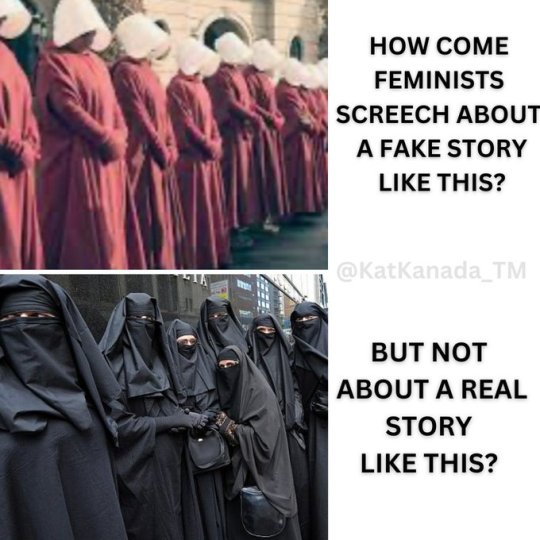#the handmaids tale memes
Explore tagged Tumblr posts
Text

#memes#the handmaids tale memes#Star Trek#what do you mean#Picard#owns private property#the handmaid's tale#meme#you expect me to believe#that people are working double shifts#and being waiters in#deep space nine#for no money#just for the love of serving#as a#communist#I appreciate the no money everyone has their basic needs met of#the federation#but come on#it’s been decades#and you haven’t come up with how you society works#commander Lawrence#is so smart because he came up with#gilead#economic system#me: may I see it#the handmaids take writers: no
17 notes
·
View notes
Text

#ethel cain#mother ethel#mother cain#hayden anhedönia#donald trump#elon musk#elongated muskrat#us politics#united states#protest#deny defend depose#class solidarity#class consciousness#meme page#us news#world news#the hunger games#the hunger games katniss#animal farm#the handmaids tale
3K notes
·
View notes
Text

Because they are hypocrites, that's why.
#meme#memes#shitpost#shitposting#humor#funny#lol#satire#funny memes#irony#facts#islam#the handmaid's tale#anti feminism#feminism#fact#dark humor#funny meme#funny humor
312 notes
·
View notes
Text
We are fucked

#us elections#idiocracy#the hunger games#orwell 1984#the handmaid's tale#fahrenheit 451#equilibrium#book memes#movie memes#we're fucked#we're cooked#wtf was that#venn diagram
52 notes
·
View notes
Text

Just made a clearer version of this meme. Sadly apt.
#the handmaid's tale#elisabeth moss#disagree#friends#politics#political#us politics#american politics#fascism#fascist#autocracy#democracy#meme#memes#political memes
33 notes
·
View notes
Text

both options seem equally possible with them
#serena x june#june x serena#sj#s x j#serena joy#june osborne#serena joy waterford#art#digital art#tht#the handmaid's tale#meme#a meme taken way too seriously i know
92 notes
·
View notes
Text
Yeah I feel like the author of the article might be on Tumblr tbh ->

joking obviously... also, one day I'll do a full-on queer analysis of 1984 --
#academic shitposting#academic memes#unless...#winston smith#1984#george orwell#handmaid's tale#margaret atwood#jstor my beloved#jstor#academia memes#literature#literature memes#sorry everyone#orwell#english literature#english lit memes
15 notes
·
View notes
Text

#halloween#happy halloweeeeeeen#funny#meme#fuck elon musk#fuck musk#fuck twitter#quotes#twitter post#twitter#life quote#ex twitter#the handmaid's tale#the handmaiden#spooky#spooktober#spooktacular
3 notes
·
View notes
Text
It’s always WHO is Atwood not HOW is Atwood.
#started reading the handmaids tale and holy shit#classic lit#classic lit memes#classic literature#classic literature memes#margret atwood#the handmaid's tale
2 notes
·
View notes
Note
just saw a shitpost about a “breeding visa” for japan’s dangerously low birth rate and it was so jarring that I ran to your blog bc I feel like there’s something there that you could eat up
Omg you're so right,,, even as a meme, there's still lots of potential!!! The concept of a breeding visa paired with that of a language barrier......... your yan visiting from abroad with the breeding visa and being granted the opportunity to choose from a selection of eligible darlings. And you can hardly understand what he's saying. All you know is that now you have to bear this stranger's child in an effort to help with the low birth rate problem, and there's nothing you can do because it's made mandatory by law. >_< perhaps it's something dystopian like in The Handmaid's Tale.
Poor darling who can hardly understand what your yan is saying as he's breeding you full. </3 the Stockholm syndrome potential........ the circumstances are so twisted that inevitably you might find comfort in or even love your captor once you're pregnant and "domesticated."
206 notes
·
View notes
Text






gif request meme - @bo-kryzze asked: THE HANDMAID'S TALE + FAVORITE EPISODE = 1.10 “Night”
#the handmaid's tale#thtedit#handmaidsdaily#usertj#userpegs#tusereliza#dailytvwomen#femaledaily#tvedit#filmtvcentral#cinemapix#televisiongifs#tvfilmgifs#mediagifs#myedit
151 notes
·
View notes
Text
The Handmaid's Tale memes were more accurate than any memer could have possibly imagined.
Leftoid women don't just lie about this stuff, they fantasise about it. They're not scared of the fash taking control, they're begging for it.
Every time they dye their hair or get a septum ring or attack men or scream in the streets is a desperate plea for boundaries and structure in a society that won't give them any.
47 notes
·
View notes
Text
Imagining fairy tales as Disney Golden Age animated films:
Thumbelina
The opening storybook is about her mother wanting a child and planting the flower seed to get one.
The story then starts with Thumbelina's "birth" from the flower. She's presented as not quite an infant, but as a very young child. Long sequences of her exploring the cottage and garden of her home.
A lot of work put into perspective--keeping this at Thumbelina's level, showing the world as a huge place. Extreme work put into details because everything is oversized. It's beautiful, very realistic, almost bankrupts them, and no one appreciates it.
The mother is rotoscoped, while Thumbelina herself is a bit more cartoony.
All the animal friends in this story are extremely cute. The toads sit in this uncanny valley between cartoonish and realistic that makes them scary in a different way than was intended. A particularly silly-looking screenshot of one of them becomes a meme.
Thumbelina's main struggle is staying cheerful through all her dangerous misadventures. She succeeds, with song.
The mouse is a somewhat comic, somewhat anthropomorphized mouse. She's a mother figure who's more demanding than the idealized human mother of Thumbelina's carefree childhood.
Thumbelina is an excellent housekeeper for the mouse and nurse to the injured swallow.
The mole is presented as a comic character who turns unexpectedly sinister when Thumbelina resists his marriage proposal. There's a nightmare sequence of Thumbelina going into his tunnels and feeling trapped and fleeing with terror into the sunlight.
It ends with a very Fantasia-esque ballet-inspired sequence as Thumbelina finds a home among the flower fairies.
The Goose Girl
Opening storybook explains how the princess is sent off to marry a prince, the handmaid is jealous, and steals the princess' identity, forcing her to work as a goose girl.
The goose girl is very kind to her geese. The geese are cute and provide lots of silly little slapstick interludes set to music.
Falada is pastured with other horses nearby, and the goose girl talks to him. He's a very expressive animal companion, but still silent.
The prince meets the goose girl unexpectedly in the pasture. They get a cute little love duet.
The handmaid gets threatened by this and recruits Conrad the goose boy to kill the goose girl.
The wind is presented early on as another living thing that the goose girl is kind to. Perhaps a windy day is causing her trouble, and she unthinkingly is like "Stop it!" as it sends some adorable little goslings tumbling over each other. And then it turns out the wind is a living creature, and takes various shapes with leaves and things, and proves to be a bit bashful at being scolded, and has a long sequence of helping to tidy up and generally being playful.
When Conrad tries to kill the goose girl, she calls on the wind for help, and it becomes this terrifying elemental force that leaves her and us shocked at what she's just unleashed.
The princess flees and runs into the prince, who is unable to get the full story out of her (either because she's too terrified to think straight, can't speak because of some vow, or has some reason to think she can't trust him).
Conrad runs back to the handmaid, who decides to kill the princess herself.
The princess tries to escape on Falada during a thunderstorm. The handmaid tries to chase her down and in the process Falada winds up getting killed or injured so the goose girl either has to flee on foot or just plain stop to help him, thus allowing the handmaid to catch up.
The geese and the wind work to get the prince there in time to hear the handmaid reveal that she's not the true princess and to save the true princess just as the handmaid winds up getting trampled/pushed over a cliff by her own horse.
Very brief happy ending--all sunshine and flowers and happy choir singing--as the goose girl goes back to the palace in the arms of her beloved and takes her place as the true princess.
#fairy tales#fairy tale retellings#disney#random thought of the day#the goose girl#thumbelina#i think the goose girl might work better as silver age#if we want to retain the talking horse part of falada i think that element works better if he's a renaissance-era talking animal sidekick#in which case the goose girl would be one of those golden-age ideas that never came together until they broadway-ed it up in the '90s
41 notes
·
View notes
Note
26 fem writer (she/hers) looking for other 25+ writers for some fandom-based roleplays. I enjoy writing male and female characters, prefer to double, and enjoy lots of ooc chat/meme sharing/character gushing. I have no preference in terms of m x f, f x f, or m x m pairings. Below are the fandoms I am interested in and what I’m looking for. 🌘
The Handmaid’s Tale
oc x oc only
I have two fleshed out ocs I would love to write for this fandom. One is a fem handmaid and the other is a male guardian/eye. Both have the opportunity to be in non-heterosexual relationships. Please bring the angst, drama, and heartbreak of a forbidden romance set in this universe.
Deadpool & Wolverine
oc x oc, oc x cc, cc x cc
I love the idea of exploring this world, specifically through either with hijinks from the TVA or set entirely within the Void as our characters fight for survival. Open to focusing on the main cast, canon-divergent existing marvel characters, strictly on ocs, or a mix of them all.
Moonknight
oc x oc, oc x cc
I have a lovely oc I’d love to use who is an avatar similar to that of Marc Spector. I am open to playing her against the system, or an oc if you have one you’ve been hoping to use. If you do feel open to playing the three for me, I am happy to discuss playing other marvel characters for you in return or the system against an oc of yours.
Interested? Please leave a like below and I will reach out.
,
#the handmaids tale roleplay#the handmaids tale rp#deadpool and wolverine roleplay#deadpool and wolverine rp#moonknight roleplay#moonknight rp
7 notes
·
View notes
Text

spending most of my time in the library designing the cover instead of actually doing the presentation? It's more likely than you think...
#literature#margaret atwood#jacques derrida#derrida#philosophy memes#women's literature#literature memes#handmaid's tale#gradblr#stu(dying)#history#history memes#archive
18 notes
·
View notes
Note
26 fem writer (she/hers) looking for other 25+ writers for some fandom-based roleplays. I enjoy writing male and female characters, prefer to double, and enjoy lots of ooc chat/meme sharing/character gushing. I have no preference in terms of m x f, f x f, or m x m pairings. Below are the fandoms I am interested in and what I’m looking for. 🌘
The Handmaid’s Tale
oc x oc only
I have two fleshed out ocs I would love to write for this fandom. One is a fem handmaid and the other is a male guardian/eye. Both have the opportunity to be in non-heterosexual relationships. Please bring the angst, drama, and heartbreak of a forbidden romance set in this universe.
Deadpool & Wolverine
oc x oc, oc x cc, cc x cc
I love the idea of exploring this world, specifically through either with hijinks from the TVA or set entirely within the Void as our characters fight for survival. Open to focusing on the main cast, canon-divergent existing marvel characters, strictly on ocs, or a mix of them all.
Moonknight
oc x oc, oc x cc
I have a lovely oc I’d love to use who is an avatar similar to that of Marc Spector. I am open to playing her against the system, or an oc if you have one you’ve been hoping to use. If you do feel open to playing the three for me, I am happy to discuss playing other marvel characters for you in return or the system against an oc of yours.
Interested? Please leave a like below and I will reach out.
gvie a like and anon will get back to you
#mcu roleplay#mcu rp#fandom rp#fandom roleplay#oc roleplay#oc rp#the handmaids tale roleplay#the handmaids tale rp
7 notes
·
View notes